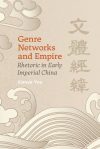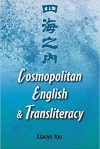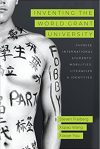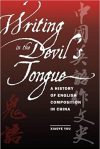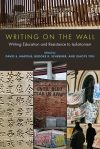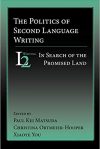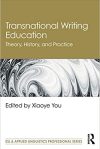Xiaoye You
Mailroom: 430 Burrowes Building
Mailroom: 430 Burrowes Building
Curriculum Vitae
Education
Professional Bio
My scholarship has aimed at engaging rhetoric and composition scholars in meaningful conversations and cooperation across geopolitical and disciplinary boundaries. To cross these boundaries, I have authored and collaborated on seven books with authors of different national, ethnic, and disciplinary backgrounds; I have employed multiple research methodologies including historical and situated/ethnographic studies.
My first monograph, Writing in the Devil's Tongue: A History of English Composition in China (SIUP 2010), was the recipient of the 2011 CCCC Outstanding Book Award. Tracing the evolution of English-Chinese bilingual composition in China, the book reveals how Chinese teachers and students negotiated with local and imported rhetorical traditions to forge new ones. Challenging and rewriting U.S-centered composition histories, the book breaks postcolonial barriers in rhetoric and composition scholarship.
Building on this scholarly and pedagogical agenda, my second monograph, Cosmopolitan English and Transliteracy (SIUP 2016), which won the 2018 CCCC Research Impact Award, argues for a transnational approach to research and teaching in composition studies. My book first articulates a novel transnational frame for writing education by incorporating three constructs that have not yet been fully integrated in previous scholarship - translingualism, transculturalism, and cosmopolitanism. The book then explores the affordances and challenges of enacting a transnational approach to the teaching of writing. Using case studies conducted in a first-year composition course, an advanced English Studies course, and a graduate seminar in rhetoric and composition, I demonstrate how attending to translingual and transcultural practice inside the classroom can help cultivate a cosmopolitan disposition among students.
My co-authored book, Inventing the World-Grant University: Chinese International Students' Mobilities, Literacies, and Identities (Utah State UP 2017), further helps to push composition studies outside of the national framework. Supported by a CCCC Research Initiative Grant, the book examines the translocal literacy practices of Chinese international students at a Midwestern state university in the United States and an international summer school in China. The complex relationships between these sites - with many of the international students at U.S. universities returning to China during the summer to attend the international school - serve as a means to map out how languages, identities, ideologies, pedagogies, and literacy practices travel across borders. This book offers situated case studies of administrators, teachers, and students' everyday literacy practices in order to understand the material and social structures shaping and shaped by their traversals in and across the higher educational landscape.
My recent book, Genre Networks and Empire: Rhetoric in Early China, integrates a decolonial and transnational approach to construct a rhetorical history of early imperial China. I center ancient Chinese rhetoric by focusing on how an imperial matrix of power was established in the Han Dynasty through genres of rhetoric and their embodied circulation, and through epistemic constructs such as the Way, heaven, ritual, and yin-yang. Through the concept of genre networks, derived from both ancient Chinese and Western scholarship, I unlock the mechanisms of early Chinese imperial bureaucracy and map their far-reaching influence. I consider the communication of governance, political issues, court consultations, and the regulation of the inner quarters of empire. I closely read debates among government officials, providing insight into their efforts to govern and legitimize the regime and their embodiment of different schools of thought. Genre Networks and Empire embraces a variety of rhetorical forms, from edicts, exam essays, and commentaries to instruction manuals and memorials. It captures a range of literary styles serving the rhetorical purposes of praise and criticism. In the context of court documentation, these genre networks reflect systems of words in motion, mediated governmental decisions and acts, and forms of governmental logic, strategy, and reason.
Areas of Specialization
Rhetoric and Composition
transnational writing studies, comparative rhetoric

